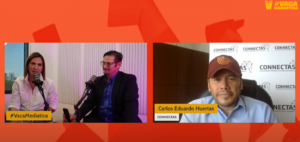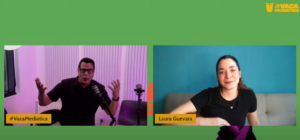Venezuelan journalism is in crisis. For years, non-governmental organizations have denounced the systematic closure and blocking of news websites. However, following the 2024 presidential elections, persecution and criminalization of the profession, coupled with the cutting off of international funding sources, has brought independent journalism to the brink.
As a way to save the journalism that still endures within the country, the Latin American media platform Connectas organized a fundraising telethon on May 17.
The event was called the Vaca Mediática. In Venezuelan Spanish, the word "vacá" (cow), in addition to being the name of the female mammal that provides meat and milk, refers to a fundraising event that is often organized around a party so that all attendees can contribute.
According to Connectas' website, the funds raised are intended to guarantee the salaries of workers involved in the daily operations of independent media outlets, safeguard the safety of journalists and work teams, modernize technological and narrative tools, and train staff to continue innovating in the region.
“Our colleagues in Venezuela don't have the freedom to do what we're doing,” exiled journalist César Batiz, director of the media outlet El Pitazo, said during the nearly four-hour telethon broadcast. “We're standing up for them, and the efforts we're making are for our colleagues in Venezuela, working day after day to spread information despite blockades, persecution, censorship and pressure.”
Like Batiz, all the Venezuelan journalists, artists and influencers who participated in the telethon are based outside the country. The broadcast was conducted live from a studio in Miami, with coverage to other parts of the world.
Additionally, messages from telethon participants were shared widely on social media, covering the feeds of anyone interested in Latin American journalism.

“Journalism in Venezuela maintains its passion, its courage, its professionalism and even its humor,” Carlos Eduardo Huertas, director of Connectas. (Photo: screenshot)
The telethon benefits 15 independent media outlets in Venezuela: Arepita, Efecto Cocuyo, El Pitazo, Caracas Chronicles, Cazadores de Fake News, Instituto Prensa y Sociedad Venezuela (Ipys), La Vida de Nos, Medianalisis, Monitor de Víctimas, ProboxVE, Reporte Ya, Runrunes, Servicio de Información Pública, Tal Cual and VE sin filtro.
None of these outlets have paywalls, so the information they provide is completely free.
Donations can be made through the website vacamediatica.com. These donations can be made anonymously, and there is also the option to choose to give the money to a specific media outlet or organization.
There are three payment methods: PayPal, credit card, and Zelle transfer. For every dollar received during the Telethon, the Martin Baron Fund pledged to donate an additional 20%.
LatAm Journalism Review (LJR) contacted the Vaca Mediática team via email which said the fundraising campaign will run until May 24.
“The main goal of la Vaca Mediática isn't fundraising. It's the beginning of something bigger,” they said. “It's more of a message that we're united and that we're in alliance. Our collaboration helps us overcome censorship and give us security.”
“Journalism in Venezuela maintains its passion, its courage, its professionalism and even its humor,” Carlos Eduardo Huertas, director of Connectas, said during the telethon broadcast. “A phrase I’ve heard a lot from Venezuelans is ‘mano, tengo fe’ (Bro, I have faith).”
In honor of that faith and humor, the telethon featured not only renowned Latin American human rights defenders and journalists, such as Laura Zommer, co-founder of Factchequeado; Oscar Martinez, editor in chief of El Faro of El Salvador; Adriana León, manager of the press freedom program at the Press and Society Institute; Carlos Fernando Chamorro, founder of Confidencial of Nicaragua; and Pedro Vaca, Special Rapporteur for Freedom of Expression of the IACHR.
Venezuelan artists and comedians of various generations also participated. The first to show their support were the members of El Cuartico, a podcast hosted by Chucho Roldán, Estefanía León and Daniel Enrique, which has hundreds of thousands of listeners each week.

Singer Laura Guevara spoke about the importance of freedom of expression. (Photo: screenshot)
“We use a lot of information about Venezuela for our episodes, and we've realized that it's increasingly difficult to obtain data. That's why we're here to lend a hand to Venezuelan journalism,” Roldán said. “Journalism is key to leaving a record and a mark on history. If you don't keep records, it's extremely serious.”
Also participating from the Miami studio were announcer and comedian Luis Chataing, actress Carolina Perpetuo and host Nelson Bustamante.
Special appearances were made by writer Leonardo Padrón, poet Alberto Barrera Tyszka, singer Judy Buendia, actress Juliet Lima and comedians Laureano Marquez and Ricardo del Bufalo.
Singer Laura Guevara performed a song titled "Latidos" (Beats), which speaks of reinventing oneself and getting back on one's feet despite difficulties. She also spoke about the importance of freedom of expression.
“I think it's wonderful that they're doing this Vaca Mediática to recognize expression as the most powerful human need we all have,” Guevara said. “I will always be grateful that, despite all the challenges, they decided to commit to the truth and to doing what's right.”
Host Eli Bravo made a live financial contribution and emphasized that journalism cannot stand alone.
“We have fun at this Vaca Mediática because humor is part of being Venezuelan,” Bravo said. “But we can't lose sight of the way independent media outlets are defending the profession in such a difficult context.”